Psycho-Pass: Understanding Structural Violence
Airing in October of 2012, directed by Naoyoshi Shiotani and written by Gen Urobuchi, Psycho-Pass has received continuous praise for its psychological and technological exploration of a young dystopian society. The story takes place in Japan, which has adopted a state of isolationism from the rest of the world in favor of an authoritarian regime. However, the government is not comprised of people: Japan now relies on an intricate technological overlord known as the Sibyl System, which operates through an omnipresent system of cameras and sensors in order to monitor the entire population of Japan. This article will explore the various themes of structural and necroviolence presented throughout the series, as well as the issues of a smothered or entirely usurped sense of humanity in the world of Psycho-Pass through the lens of thinkers such as Hegel, Foucault, Nietzsche, and Caillois.
**SPOILERS AHEAD**
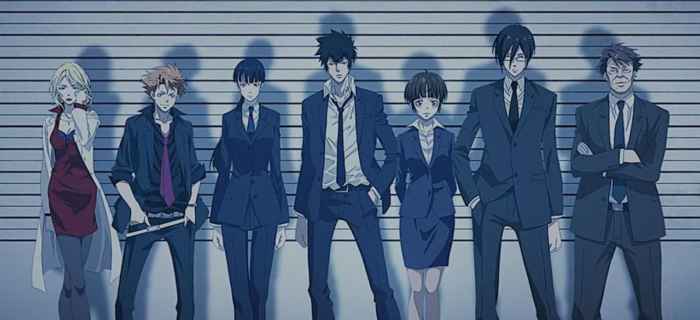
Panopticism
Taking place in a dystopian authoritarian society, Psycho-Pass offers an interesting variety of themes related to structural violence. One of the most integral aspects of the plot- the Sibyl System- is the source of most all of the structural violence that takes place within the series. Operating as the new mode of governance in this future authoritarian dystopia, Japan has achieved a “peaceful” society by sacrificing human agency in favor of a technological dictator called the Sibyl System. The Sibyl System is fully integrated into Japan’s social sphere, and uses a panoptical collection of cameras and sensors placed all over the cities in order to monitor citizens’ psycho-passes. A person’s ‘psycho-pass’, which is the series’ namesake, is a twofold system of measurement that includes a person’s ‘hue’, or overall psychological state, as well as a ‘crime coefficient’, which is indicative of how criminally inclined an individual is. In this way, Sibyl not only controls how individuals think and behave, but also dictates how they live their lives. Specifically, Sibyl is in charge of assessing one’s cognitive skills and places you in a job field that is an appropriate fit for the state of your psycho-pass.
The first and most obvious instance of the structural violence imposed by Sibyl is the system’s panoptical nature. Similar to the panopticon described by Michel Foucault in Discipline and Punish, Sibyl is able to watch every citizen almost simultaneously, which encourages the citizens of Japan to behave themselves at all times to the point where it may even be unnecessary for Sibyl to keep a constant watch over them: such is the ultimate goal of the panopticon. Since there is no escaping Sibyl’s grasp while also living a regular life, many are forced to give up any semblance of agency and are unable to fulfill their innermost desires; the panopticon of the Sibyl System all but demolishes any trace of humanity’s free will.
The effects of Sibyl and its violence against humanity does not stop there: through the standardization of humanity using the psycho-pass system, Sibyl not only has the power to determine where an individual fits into society, but also has the power to decide if an individual is not allowed to fit into society at all. The psycho-pass system uses cymatic brain scans to determine a person’s ability to be left in society; if an individual’s crime coefficient exceeds the regulation value, the system alerts the Public Safety Bureau (MWPSB) and the individual is pursued to be apprehended or killed by law enforcement. If apprehended, the individual’s psycho-pass is often unable to recover and they are labeled a ‘latent criminal’, effectively making them a second-class citizen. Latent criminals are not allowed out into society, and are typically locked away in solitary confinement, since they are deemed as unhelpful and ultimately a threat to Sibyl’s peaceful society.
Ironically, however, Sibyl does allow for some latent criminals to be released into society: these individuals are referred to as Enforcers, and they work for the MWPSB as detectives. Enforcers, however, are still second class citizens- they are not allowed out of the MWPSB office alone without explicit permission from their superiors (called Inspectors), and in general they are treated as sub-human, which is yet another example of the complicated structural violence that Sibyl has put in place.
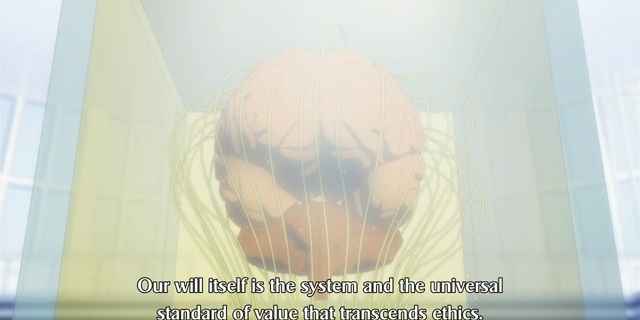
Necroviolence
Sibyl also demonstrates instances of necropolitics and necroviolence against humanity. Necroviolence is a facet of necropolitics, a term coined by Achille Mbembe, which relates to the power of sovereign bodies over life and death, necroviolence specifically having more to do with sovereign treatment of the body post-mortem. Sibyl’s necropolitics and necroviolence towards humanity is nuanced and multifaceted; much more obvious than the disease of serenity that Rikako discusses, an example of Sibyl’s necroviolence as the acting sovereign body is the creation and use of a weapon called The Dominator. Also known as the Dominator Portable Psychological Diagnosis and Suppression System, The Dominator is one of the only weapons used by the MWPSB (Public Safety Bureau).
The Dominators work by reading and sending a target’s psycho-pass directly to the Sibyl System for a crime coefficient calculation, and have four settings apart from the automatic safety: Non-Lethal Paralyzer, Lethal Eliminator, Destroy Decomposer, and Explosive Destroy Decomposer; only when the target’s crime coefficient exceeds regulation value will The Dominator receive authorization from the Sibyl System to abandon its otherwise constant state of automatic safety. Apart from the more subtle structural violence imparted by Sibyl through the use of The Dominators, such as the usurpation of human decisionmaking concerning morality, along with questions as to whether or not the use of a Dominator for killing means that the user is killing, or Sibyl is killing, there is a distinct element of necroviolence that occurs with the use of The Dominator. Sibyl allows for the use of The Dominator’s Lethal Eliminator setting against a person only if their crime coefficient exceeds 300; once an individual’s psycho-pass indicates a crime coefficient of this level, Sibyl deems that they are unfit to remain in society at all, even in solitary confinement. Known also as the “anti-person lethal mode”, The Dominator will alert it’s registered user if and when they are needed to eliminate a target, requesting for them to “please aim carefully.”
Eustress Deficiency is one noticeable way in which the Sibyl System commits necropolitical acts against the Japanese public; in a society that has sacrificed all that it means to be human for the sake of a sense of peace, humanity has also given up their driving life force: stress. Eustress Deficiency is the disease of Psycho-Pass’s Japan. As the show’s main antagonist Shogo Makishima discusses, Eustress Deficiency is thought to be the leading cause of death in Sibyl’s new society, though these deaths are continuously declared to be “heart failure from an unknown cause.” Since Japan now operates on the psycho-pass system, citizens are exposed to excessive stress care in attempts to keep their hues and crime coefficients within the limits designated by Sibyl. As Shogo points out, stress is a driving force in life- with the appearance of the Sibyl System and the psycho-pass, people began to find their sense of stress “numbed so much that patients who can’t even recognize stimulation itself started appearing.”
Individuals who suffer from Eustress essentially became living corpses, their autonomic nervous system ceasing to function independently and their vital functions eventually shut down completely. Rikako Oryo, a murderous psychopath who works briefly with Shogo Makishima, has a striking commentary on this phenomenon. Rikako’s father, previously a famous painter known for the transgressive nature of his artistic exploration of the self, suffered from Eustress Deficiency which eventually led to his death. Rikako referred to Eustress as a “disease of serenity”, saying “Everyone here is the same. They don’t notice anything. They don’t say anything. And they don’t think anything. They are merely a shell of their former selves and soon they will disappear like the melting snow. This epidemic leads innocent people to their deaths, and yet, this pathogen will never be eradicated. This is a disease called serenity- a form of death that the people have wished for.” In humanity’s search for the ultimate peace, humanity has also signed its own death warrant.
This relationship between Japan and its mistakenly incomplete wish for peace is illustrated further by the name choice of The Sibyl System itself. The Sibyl System is named for the Cumaean Sibyl of Greek mythology, an oracle who wishes for eternal life from the god Apollo, but erroneously forgets to also wish for eternal youth. Sibyl wastes away throughout eternity until she shrinks to a size small enough to fit into a jar, which is hung from a tree. The village children dance around her, mocking her as they chant, “Sibyl, Sibyl, what do you wish for?” to which Sibyl replies, “I wish to die.” By choosing the name of Sibyl for the authoritarian overlord that Japan has chosen to give up its humanity to, the creators draw an important parallel between the Japanese public of Psycho-Pass and the Cumaean Sibyl from Greek mythology: both had steep and momentous desires, but made the mistake of not thinking them through. The careless wishes of both the Cumaean Sibyl and the Japan in Psycho-Pass leads them to the grievous consequence of a hellish serenity which they themselves have chosen.
The way in which The Dominator’s Lethal Eliminator setting affects the human body upon contact is the most noticeable instance of Sibyl perpetuating acts of necroviolence; the way in which The Dominator kills acts as a method of erasure, which is a common theme in discussions of present-day sovereign power. Upon contact, the Lethal Eliminator mode causes mass swelling of the target before the individual’s body completely explodes; the whole process takes roughly two seconds, and when it is over often all that remains of the target is a pile of blood and entrails.
In this manner, The Dominator completely erases what was once a living person- someone with a name, a personality, a family- and leaves behind nothing but completely unidentifiable organic matter; the Dominator annihilates not only its target, but also a chance for the individual to be identified, or even grieved for. Once the scene is cleared, no trace remains of the violence committed by Sibyl against the individual- as such, Dominators are able to erase the proof of Sibyl’s violence completely. There remains nothing to apologize for, since the body no longer exists; and, if it does, the body is not remotely recognizable enough to find anyone to apologize to. A notable instance of this erasure by the sovereign occurs toward the peak of season one: an Enforcer by the name Shusei Kagari stumbles upon classified information regarding the Sibyl System, only to be discovered by a cyborg operated by the Sibyl System itself. Having the ability to control The Dominator at will, Sibyl uses the Lethal Eliminator mode despite Shusei not possessing a crime coefficient above the designated limit of three hundred. Shusei’s body, having been completely obliterated by The Dominator, is never found- it is never known by many at the MWPSB whether Shusei was killed, or fled the MWPSB to escape his life as an Enforcer. The treatment by Sibyl of Shusei’s body, and others like him, indicates that as a sentient system it truly regards itself as a sovereign body. As such Sibyl views itself as being privileged to dictate how to treat the bodies of Japan’s citizens both before and after death. This treatment, as per the theory of necroviolence, is often lacking in respect and human decency.
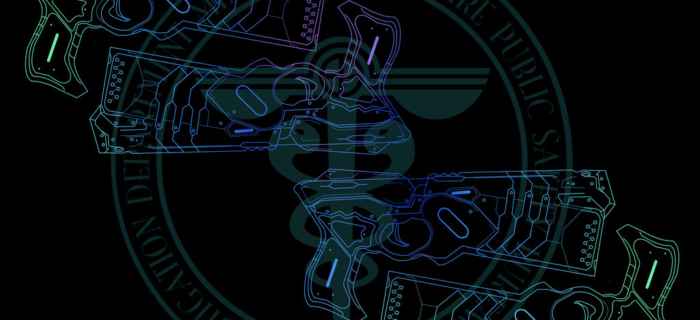
Structure, Hierarchy, and Law Enforecement
The MWPSB itself is one of the best examples of Sibyl’s violence at work. The Public Safety Bureau is set up in the manner of a machine- the employees of said Bureau are expected to accept Sibyl’s commands unquestioningly, and to ensure this Sibyl has actively sought the de-education of law enforcement. Employees of the MWPSB- effectively detectives or cops- are no longer given any sort of criminal justice training, for fear that such training will not only lead to a deviation from the system in terms of action, but will also cause an individual’s crime coefficient to deviate from the regulation value. In this instance, Sibyl operates in a Nietzschean manner, seeming to fear that “He who fights with monsters should be careful lest he thereby become a monster. And if thou gaze long into an abyss, the abyss will also gaze into thee.” However, in a manner similar to how Nietzsche describes Christian morality, Sibyl is unable to establish itself without being in opposition to something: in this case, Sibyl is fundamentally opposed to the latent criminals but, as such, Sibyl’s unquestioned authority is simultaneously contingent on latent criminals existing so that the system may continue to cast them out to continuously assert its authority. Similarly, Sibyl’s arm of law enforcement also relies upon latent criminals; since Inspectors are required to maintain a psycho-pass within Sibyl’s regulations, they are often unable to do the job of a real detective, which requires one to “stare into the abyss”, so to speak.
Operating on this logic, the MWPSB becomes a system reliant on a relationship similar to a master and a dog (Inspectors and Enforcers, respectively). Because Inspectors are rendered unable to perform any real law enforcement themselves, Sibyl requires latent criminals who can become Enforcers in order to maintain any semblance of public law enforcement. Sibyl’s creation of the juxtaposing positions of Inspector and Enforcer operates in a manner reminiscent of Caillois’ theories surrounding notions of the sovereign and the executioner. Caillois is careful to point out that the sovereign and the executioner (Sibyl/Inspectors and the Enforcers, respectively) evoke each other through their antagonistic natures toward one another. In Michel Leiris’ writing on the subject, he argues that the opposing natures of sovereign and executioner fulfill “cardinal yet symmetrical functions” that render them equally untouchable, both by society and each other. Enforcers operate in a manner that is strikingly similar to the executioner that both Caillois and Leiris discuss: since the weapon they carry- detective work- is the “contagion of the sacred”, those who adhere to the sacred are thus unable to use it while still operating within the sacred body. The Inspectors, working as Sibyl’s right hand, are thus rendered unable to perform the duties of executioner that a law enforcement agent would perform in a more traditional society.
This illustration of Enforcers symbolizing the executioner as Caillois describes him is even further embodied in the relationship between Nobuchika Ginoza and Tomomi Masaoka, the father-son pair of Inspector and Enforcer in the MWPSB. Having been a detective during the time leading up to Sibyl’s instillation, Tomomi is the embodiment of an anachronistic worldview in the face of drastic cultural shifts. As an Enforcer under Sibyl’s relatively new regime, Tomomi aligns with Caillois’ concept of the executioner not only in that he works “cardinal and symmetrical” to the sovereign, but also in that his son inevitably follows in his footsteps. The space in society that the executioner occupies, for Caillois, is also shared by his family; as such, “the executioner” as a title was often viewed as hereditary. Similarly, although Nobuchika is determined not to commit the same mistakes as his father, he nonetheless is unable to maintain the state of his crime coefficient after Tomomi’s death and eventually takes over his position as the MWPSB.
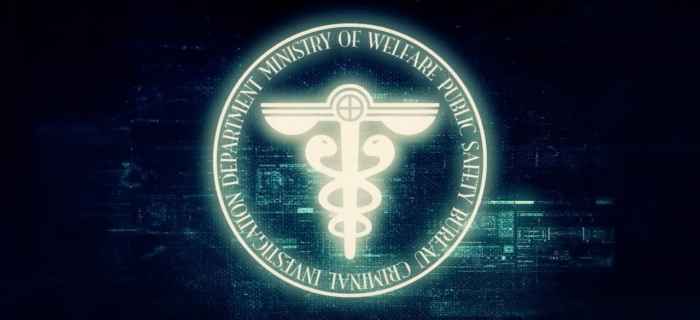
Subject Formation
Lastly, G.W.F. Hegel’s Phenomenology of Spirit provides an interesting perspective as to how consciousness develops, and is yet another theme of the structural violence presented in Psycho-Pass. In Hegel’s dialectic, he posits that a consciousness develops through how it relates to the outside world as well as to itself. On this model, when two consciousnesses (not yet defined as self-conscious) encounter one another, a struggle for recognition ensues; this leads to what Hegel refers to as the “master-slave dialectic”. Hegel’s dialectic, however, operates on the assumption that both conscious parties assume themselves to be entirely free and unrestrained. In the world of Psycho-Pass, this is not at all the case. With the Sibyl System in place as the ultimate decider of the course any citizen’s life will take, Sibyl acts as the end-all be-all of Hegelian recognition, although it does not operate in the traditional sense of two individuals battling for recognition and “self-consciousness”. Instead, Sibyl recognizes each citizen through a grade of sorts, marked by one’s psycho-pass, which will ultimately determine what a person will go on to be in life, thus determining their societal value. Human agency and decision making, moral judgements, ethical frameworks, etc., have all been superseded by Sibyl, thereby replacing the need for an “Other” for recognition (as per the Hegelian model). Sibyl now embodies the deciding factor as to whether or not a person is valuable to society; as such, it would seem that Hegel’s dialectic as well as human agency in general has been overridden, which leads one to wonder whether or not self-consciousness still exists at all. Indeed, the character Shogo Makishima- the series’ main antagonist- remarks on this, saying, “Who isn’t alone in this society? The time when our connection to others was the basis of our selves is long gone. In this world where everyone is watched over by the system and live within the system’s standards, a community isn’t necessary. Everyone just lives in their own cell, and the system tames them by giving them each their own personal serenity.”
Since Hegel’s dialectic is, arguably, prone to violence (psychological or otherwise), Sibyl has worked to negate it in favor of an entirely peaceful society, one where a dialectic is unnecessary for recognition. Despite Hegel’s dialectic being made obsolete by Sibyl, there is still at least one outstanding example of the dialectic manifesting, and that is in the relationship (or perhaps “rivalry” is more appropriate) between the main antagonist- Shogo Makishima- and the main protagonist and antihero Shinya Kogami. Shogo and Shinya represent a Hegelian dialectic of two Masters battling for superiority, but also of two Slaves battling for recognition despite the authoritarian Sibyl System denying it to them. Shogo Makishima represents an anomaly in the world of Psycho-Pass: he is what is referred to as a “criminally asymptomatic” individual. This means that his psycho-pass does not indicate to the Sibyl System that he is a danger to society. It is likely due of this lack of recognition by the Sibyl System that Shogo has decided to go against it, as Shinya comments, saying that Sibyl not recognizing him as it does other citizens likely led him to feel as though he was not human at all. Rejected from society, lacking placement by the Sibyl System, Shogo falls back to the Hegelian dialectic in order to gain the recognition denied him by the Sibyl System. Shogo becomes a serial killer and a terrorist, while Shinya Kogami is an employee of the Public Safety Bureau; Shinya becomes obsessed with catching Shogo, and Shogo becomes infatuated with the game of cat-and-mouse unfolding between himself and Shinya.
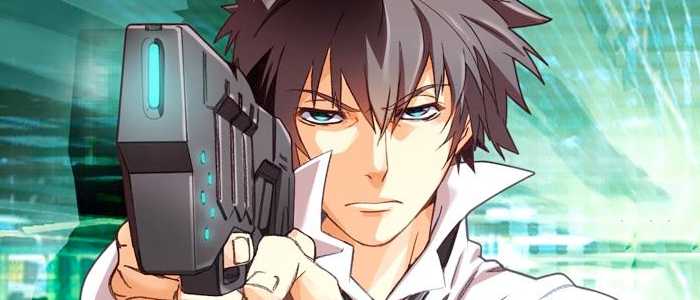
A former Inspector, Shinya Kogami was demoted to the level of Enforcer by Sibyl due to a criminal coefficient that exceeded regulation value, thereby clouding his psycho-pass. As such, Shinya and Shogo represent two sides of the same coin: Sibyl does not recognize them as wholly human, robbing them of their agency within Japan’s new dystopia. These two characters play the Hegelian dialectic out to its ultimate manifestation, the series climax occurring when Shinya at last catches Shogo and kills him with a shot to the back of the head. Although the series ends with his death, Shogo seems content in the fact that he has at last been recognized by someone- Shinya saw him as a rival, an opponent worth battling, and as an equal with which he could partially empathize. Shogo exits the Sibyl System with his own death, becoming a Master in his own right, having gained personal recognition despite being denied it by the system. Shinya exits the series having won out in his Hegelian battle with Shogo, as well as exiling himself from Sibyl by committing an act of murder, thereby replacing Shogo in some sense, as he is no longer able to return to a society dictated by the Sibyl System.
Gen Urobuchi’s acclaimed series Psycho-Pass, since its release in 2012, has been praised by some anime enthusiasts for tackling difficult philosophical and metaphysical themes including utilitarianism and the ethical dilemmas surrounding an ‘ideal society’. Urobuchi’s work also tackles themes of anthropological violence including structural and necroviolence; the many themes present within Urobuchi’s work operate both in and outside of the philosophical discourse of thinkers like Hegel, Nietzsche and Caillois. As such, the dystopian setting of Psycho-Pass offers an interesting hypothetical lens through which one may observe how theories such as Hegel’s dialectic and Mbembe’s necropolitics could manifest in a hyper-technological authoritarian society.
Works Cited
Caillois, Roger. The Sociology of the Executioner. 1939.
De Leon, Jason. The Land of Open Graves. 2015.
Hegel, G.F.W. Phenomenology of Spirit. 1807.
Mbembe, Achille. Necropolitics. 2003.
Nietzsche, Friederich. A Genealogy of Morals. 1887.
What do you think? Leave a comment.









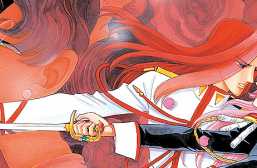

Literally just started watching Psycho-Pass again and came to The Artifice for an analysis: Thank you!
The problem I have with this show is that after Akane learns that this system is flawed and kind of based on a lie she still operates underneath it as if it is somehow the right thing to do. I don’t enjoy watching a character who seems apathetic to unjust tragedy. While I can see the parallels between the world of Psycho-Pass and our own I believe that there are people within our government who are genuinely fighting to improve it. Akane is essentially a cop who is complacent with prejudiced profiling,something shown in the real world to be inconsistently successful at it’s best.
Well it comes down to Freedom of Will Vs Security, right? In my understanding, she wanted nothing more than to expose the system for what it was. But she knew in doing so that mass pandemonium would ensue and millions would more than likely die. The people living in that society have never experienced true freedom. Shit, they didn’t even know what violence really was until makashima waltzed in. And when they were faced with violence for the first time, that society got its first glimpse of true human nature. People want to survive above anything else, and are willing to subject themselves to pretty shitty conditions in order to stay alive. Participating in your own subjugation is pretty much a prerequisite to living in a society.
So we can’t really expect them to handle that responsibility well all at once. Akane was faced with an impossible decision and she opted against societal upheaval.
I also feel like we have to consider that there is no international law (that we know of) in this fictional world. As far as we know, there are no programs in place to institute law and order. The sybil system is inherently flawed, but so is government, period.
I can’t really blame Akane for her decision, she made the choice with the least bloodshed, even if there really isn’t any true freedom in that. It doesn’t align with my westernized idea of justice, but when I really think about it, Id probably keep it a secret as well. Selfishly, I do not want to be the reason millions die, I’m pretty sure genocide would keep me up at night.
I value Psycho Pass as a well-made cool-looking cop drama show and it shines in this point. Sadly it tried to be more and failed for me.
I like psycho-pass. It is dark and gritty and human and heartbreaking and breathtaking in all the right ways, but wow do most (anime) writers have a bad understanding of the law and, particularly, law enforcement.
I will concede though that it might have been deliberate here from the side of the writers to just show how bad the regular anime viewers understanding of the law/law enforcement is, because they would be unable to tell how much the legal system had been compromised even if it hit them in the face. Sadly though in this story that means being hit in the face with a tank destroying pistol. What is the point of being alive if you are so boxed in, so conformed, that you might not even realize the difference between being alive and being dead.
If its not the gratuitously violent way the Dominator’s lethal mode disposes of “criminals” that hints at its oppressive nature, its the fact that its named “Dominator” to begin with.
It’s view of psychology is more in line with an HP Lovecraft novel than any modern view.
I love Psycho-Pass because it remains intellectually stimulating, engaging, and above all relevant despite that since the first time I’ve watched it my world view has almost entirely changed… 3 times? Maybe 4?
The first time I watched it I could only describe myself as an anarcho-communist with fascist tendencies (eat the rich level stuff). Then I found Ayn Rand & simultaneously noticed all the inconsistencies in my worldview and became a radical Objectivist. I finally started realizing that although logical & consistent, Objectivism’s problem, and that of all radical ideologies is that people aren’t perfect ideological adherents; they say and do things based on bad logic, false information, impulse and emotion, everyone, including myself, is to some degree broken & creating a perfect system is predicated on it being upheld by perfect people… In other words, no one is John Galt.
After reading the Art of War, the Book of Five Rings & the Meditations of Marchas Aurelius I stumbled upon Jordan Peterson & through him Nietzsche, Jung, Dostoevsky & several other great minds & now I sit in this weirdly undefined mishmash of ideas & inspirations which is, despite not comforming to any one group, by far the most logical, functional & most successful way of looking at existence I’ve ever had.
Despite the radical differences in theses major changes Psycho-Pass has always always been revelant. Gen really did something right here, he really created something that stands the test of time.
I think people are fundamentally mistaken when they think that law, order and communal controll is an antithesis of freedom. We can trade some freedoms to gain more freedom. If we forgo the freedom to go anywhere and take anything and enforcing it. Suddenly we are free to not have to always guard our property and can go out in the world and do everything else we want to do.
The system is similar to Germany in the 1930’s, Hitler brought prosperity to a debt-riddled country which had been in a deep recession for years. The majority of Germans had jobs, houses and a high standard of living so no-one saw any reason to question the Nazi regime because as far as they were concerned “it worked”. Anyone who disagreed was either intimidated into compliance or falsely charged with a crime against the state and sent to a slave labour camp. The other groups that the Nazis locked up were fairly disliked in general due to long-held prejudices against minorities like Jews, gays, gypsies and “people of color”. Our current system is a compromise because swinging too far one way or the other is never good. The rise of fascism and communism during the 20’s and 30’s proved that these systems only lead to their own ruination either by outside factors (like war) or decay from within. (like the USSR in the 80’s)
To be honest, while I’m impressed by some aspects of the show (like the close resemblance of the technology to modern technology) I agree with Mohr that the concept of positive liberty isn’t really a thing in the show. It’s not quite fascism/Stalinism vs nihilism in the real world.
I was a little let down by latest season. I’m sad Noitamina only gave it’s standard 11 episodes, to me it felt like it had to rushed through the story, I liked the build up of season 1. I also kept wondering if Makishima had been saved, what kind of interesting interactions and thoughts he would have had about Kamui, but we had Saiga so I was fine with that.
Also Shimotsuki was a total bitch, kinda wish she had died. She clearly has a higher mental fortitude than the average citizens of this society.
I absolutely loved the first, so I will without a doubt watch the second. The only thing is, I don’t enjoy subtitles and much prefer dubbed (there are unavoidable exceptions, like the new Fat/Stay Night) I watched the first season dubbed on Netflix. Is there a way to watch the second dubbed? They have it up on hulu, but with subs, which I would like to avoid if possible. Just not a fan of reading my shows, takes me away from whats happening on screen.
You can watch the dubbed episodes on Funimations official website.
I love Psycho-Pass, I really do. It gets so many things right, particularly the general populations attitudes and reactions, but frankly it also left so many glaring obvious plot holes in legal issues and pure logic. I do not question the science, because they went to an commendable degree at working it in.
Psycho Pass has been a favorite for me ever since I realized the series wasn’t going to just turn into a cheesy “dismantle the corrupt dystopian society” kind of story, and I’m really happy with your analysis of it!
I find the characters and relationships in this series really weak. I’m mixed on whether or not I’ll continue it.
This one is really only about three characters, Akane, Togane, and Mika—four if you count Sybil. The rest of the cast gets practically zero development.
I really, and I mean really, hated the second season. I liked the first season of Psycho-Pass (not loved, mind you, I still think the first season was a poor man’s Ghost in the Shell, still good though, just not great), but this? This sucked ass, man. They absolutely ruined Mika’s character compared to the first season, plus all in all, the series barely moved forward, with the only progress made at all being the purging of the more…..er….corrupt brains in Sybil and Sybil beginning the process of shifting into allowing Psycho-Pass checks for the group. We did NOT need 11 episodes for that shit to happen! That same stuff could have easily, and probably should have, been done within a movie or an OVA special or two.
Overall, this was boring as hell and showed little regard for the world building and character building from the first season and I only finished it because I didn’t know exactly how much this season was going to affect the movie.
When you look at it objectively, the world of Psycho-Pass is only disturbing because we get to see behind the curtain, as it were. Imagine if the modern US were presented as the setting for a dystopian film; a massively corrupt and bloated corporate oligarchy with pretensions to democracy, which actively ignores the problem of Climate Change, is home to racism, bigotry and discrimination of all kinds, where men in air-conditioned rooms can sip soda while they bomb hundreds of civilians to oblivion thousands of miles away, where the super-rich are slowly and steadily accumulating every drop of wealth available to them. It would look three times as horrifying as the world of Psycho-Pass, but because there’s so much distortion, distraction and misdirection in everyday life we just don’t think about it that much.
Individualism in the American sense is mostly an illusion. Society is still ordered and controlled, only under the direction of the owners of capital. True freedom can only exist when material essentials are met, and people are free from hierarchical power. “Freedom” that means you get killed for offending a cop or go homeless for getting sick or speaking up to your molester boss isn’t really freedom.
Psycho-Pass 2 was so much better than that horrible sequel movie
I will definitely check out Psycho-Pass this year.
What I always found hilarious about Psycho-Pass was how entrepreneurship was barely touched upon in regards to creating a happy society. It’s like an armchair intellectual’s wet dream.
I’d argue any system that judges and punishes people for what amounts to wrongthink is inherently evil. And while much of this series could probably be called an Orwellian horror, I actually see some parallels with Huxley’s “Brave New World.” A peaceful society has been established there as well, and also involves people being made to fit into certain roles, but being happy to do so. The main difference there is that in “Brave New World,” the people are literally bred to fit into those roles and be perfectly happy to do so.
I found Psycho Pass’ execution pretty shallow. I have the feeling that Urobutchi is good at presenting you cool and interesting ideas but not nearly as good in properly developing them. The series does its best to be as “in your face” as possible, killing the possibility of nuanced and subtle storytelling. It achieves this by making the majority of the characters as retarded as possible, to the point where you can’t possibly suspend your disbelief. I’m especially referring to a scene where Akane casually observes getting her friend killed in front of her without being able to do something because “muh system tells me you’re not wrong”, or the whole beating up someone while no one does anything because somehow that is such a foreign concept that this society can’t comprehend violence. It’s just laughably bad executed imo. Characters clearly know to differentiate between right or wrong given the situations they find themselves in, but Urobutchi pushes this ridiculous Oblivion to that extend jus to make a point.
The second season doesn’t exist to me, it’s just garbage.
Peace is an illusion incompatible with the human psyche and the impermanent world.
Psycho Pass sets up a lot of decent analogies to our own lives, but fails to derive anything meaningful from it; opting to revert to talking heads waxing on about philosophy and BladeRunner.
I couldn’t make it through episode 1. The obvious flaws that bothered me seemed to be what the whole show was a bout and it seemed really stupid.
Give me liberty or give me death: the anime